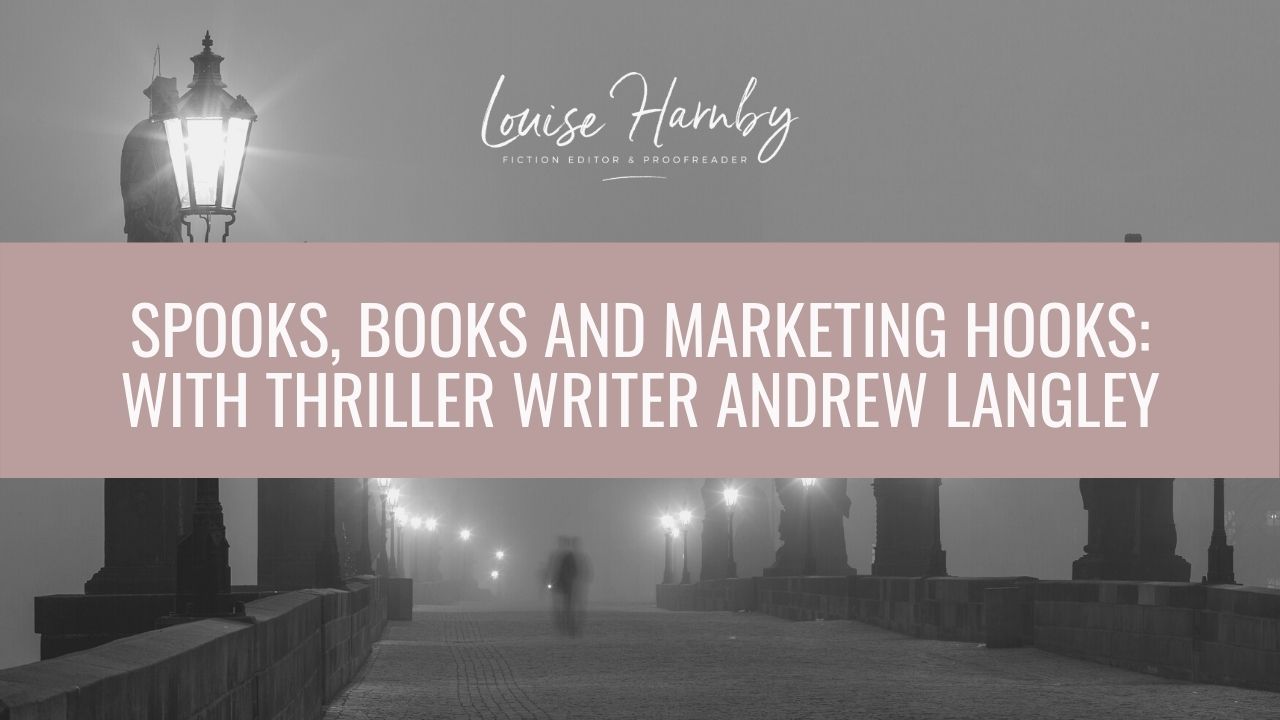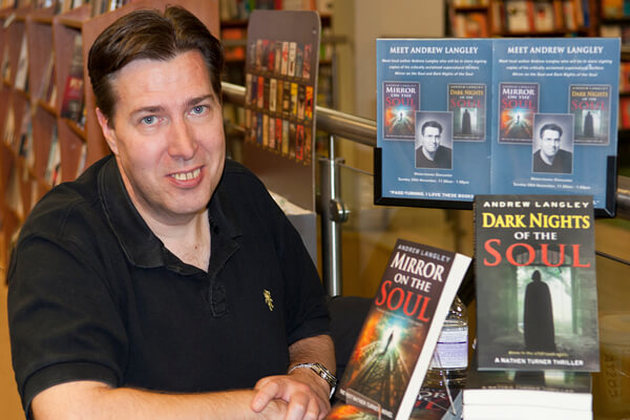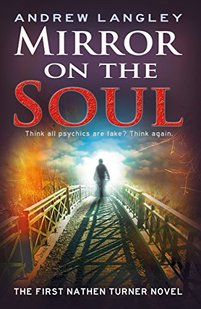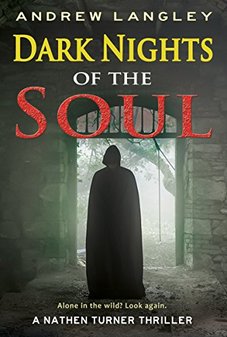|
Andrew Langley is the author of the Nathen Turner supernatural thriller series. He kindly agreed to answer some questions about his journey as an independent writer. Below, he talks frankly about marketing, the research and writing processes, and the pros and cons of self-publishing.
This post featured in Joel Friedlander's Carnival of the Indies #82
Hi, Andrew! Thanks so much for talking to me. So what have you found to be the most effective methods of marketing your books?
Thanks for having me! So, for me, the whole point about marketing a novel is profile-building and connecting with an audience, not about hard selling. Someone might write the best book in the history of publishing, but if nobody’s heard about it then nobody will buy it. The most important thing for me at the beginning was to have a website. That way, if anybody asked me about the books, I could give them the web address and they could find out more, and maybe subscribe to the newsletter. It’s more about relationship-building than trying immediately to close a sale. Months before the publication date, I send leaflets to as many bookstores as I can find, just to make them aware of the book. One time, I bumped into a bookshop worker when I was doing a radio interview. She asked me the name of my latest novel. When I told her, she said, ‘Oh, yeah, I’ve heard about that!’ So, basically, the leaflets had done their job. I also think the publication date is important. If it can be tied into some event relevant to the ideas in your story, then it gives you an angle with which to approach the press. My first two books are mysteries based in the world of the supernatural, so I published them on Halloween. I’ve found things like book signings and talks – in fact, anywhere you can meet potential readers face-to-face – much more effective than social media, though they can be a little nerve wracking! I have multiple sclerosis, so when I’m booked for a signing or interview it’s always a bit stressful because I’m wondering what my health will be like on the day. Will I feel fatigued? Am I going to start twitching? What will my pain levels be like? All those issues tend to cloud my mind before the event I’m sure authors without health complications experience nervousness too. Once I'm there, though, it’s great. I’ve found that the public tend to be genuinely interested in authors – why they write, what the book’s about, etc. – and you get to meet some truly lovely people. Another thing that worked well for me was making a load of bookmarks with the web address on. I gave out the bookmarks everywhere I could. The theory was that readers would use them in the novels they were currently reading and they’d have a constant reminder about my books. Have you tested a method of marketing but later shelved it? I’m not the best on social media. By nature, I’m quite a private person, so baring my soul to the world really doesn’t feel comfortable for me. Facebook, Twitter and Goodreads all have their place, and I do think you need to have a presence there to give readers another way of contacting you. But, for me, they don’t really generate sales. Is there anything you’ve not yet tried but would like to in the future? For my third novel in the supernatural series I’m moving the publication date away from Halloween. Although it worked well for the first two in terms of generating press interest, it’s very close to Christmas. The bookstores tend to be focused on seasonal stock and promotions at that time of year. This makes it a real challenge to arrange signings or talks. Thankfully, my local Waterstones has been very accommodating despite the staff workload. So, for the third book, even though it’ll be ready to publish Halloween 2017, I’ve moved the date to Easter 2018. This also ties in to some other events that are relevant to the story. Plus, it’s given me a different idea for a marketing strapline – ‘Relax and read a book for Easter (but keep the lights on!)'. That kind of thing!
Do you have a method or process when writing?
I live off notebooks! Everywhere I go I carry a notebook and jot down ideas. I was a photojournalist for a long time and I got used to this method of working when I was on location. Sometimes I’ll overhear a funny story in a bar and think it’ll be great to add that to a novel in the future – it all goes in the notebook for recycling later. All my background research goes into the notebooks and I handwrite the synopsis and first chapter long before I sit in front of a computer. Then I usually test the story idea with my friends and family. If they’re not immediately interested, I change it until they are. Once I have the bones of the story, I create a storyboard from beginning to end that covers the key scenes, and I write some dialogue as well to get a sense of how the characters feel in these. Once all this is done, I finally sit in front of the computer. As I already have a clear idea of the story and the characters, I try to write a chapter per day. At this stage, I don’t worry about perfect grammar or even a single nuance – I just want to get the story down from start to finish and see whether it works. I write every day for as long as it takes until I’ve nailed that chapter. It can mean very long hours. The following day, I read through what I’ve done and then start the next chapter. Once I’ve got the book finished, I put it away for a few weeks. The second pass is when I fine-tune the grammar, and make sure I’ve added in all the scents, sounds, feelings and nuances that bring the story to life. At this point I’ll let a few friends or family members read it so I can get their feedback. Then I revise the manuscript again. I might repeat this process many times before I send the file to a professional editor for review. How much research do you do for your novels, and how do you go about it? Researching a story takes me many months, even years. I always write about what I know or have experienced in some way or another. So I’ll visit the locations in the story if at all possible, take photographs, talk to the locals and get a feel for the location I’m writing about. In my photojournalist days, I travelled a lot and kept notes, so in some cases I can rely on those. My main character’s base in the supernatural series is Whitby, on the east coast. This is a town I’ve been visiting since early childhood and I still go there with my family. I love the place. The second book is set mainly in the Scottish Highlands. My father was Scottish and, again, it’s a place I know well from both work and leisure. I do other research by trawling the internet, reading relevant books or interviewing people who know about the subjects I’m writing about. I try really hard to make things as authentic as possible even though I’m writing about things like ghosts and witchcraft in the first three books. The fourth book, which I’m working on now, is a historical adventure based on the legacy of the Jacobite rebellion of 1745. For the past six months I’ve been back and forth to Scotland, checking out the locations, talking to people, visiting museums and so on. I’m hoping to finish this research by August; then I’ll write the story.
Where do you get the inspiration for your stories?
The idea behind the supernatural series came from a conversation about psychic mediums. There’d been some news claims about a famous psychic using devious methods to gather information that they’d then used in their shows to wow the public. Whether this story was true or not I don’t know, but it gave me an idea. What if there was a psychic who knew he was a fake but whose heart was in the right place? So he didn’t believe in any afterlife or spiritual world but could fake it because he believed he was doing the right thing – bringing comfort and closure to the bereaved. Now, what if this person then unwittingly summoned a very real ghost in one of his sessions, and this ghost was intent on wreaking revenge? The basic idea struck me as funny and something people might enjoy reading about. Hence, Nathen Turner, my psychic medium character, was born. The idea behind the adventure I’m writing now came after I stumbled across a news story about the Jacobites. I can’t say too much about this one at the moment but I’ll put information about it on the website or my Goodreads blog once I’m further into the process! Have you ever suffered from writer’s block? If so, how did you get through it? A very weird thing happens when I’m stumbling over my writing – the characters seem to come alive and tell me what they’d do! I know this sounds bizarre but the characters are real people in my head. Many times, I’ve wondered where to go in a scene but written it anyway. Then I’ve read it back and thought: This person wouldn’t behave like that. So I change it. I think that the more you work with your characters the more this tends to happen. Sometimes I look back and can’t even remember writing a particular scene – it's like I’ve had a stream of consciousness and become so wrapped up in the story that I’ve put it down without thinking too deeply about it. Occasionally, I’ll end up pacing around the garden or heading for a strong caffeine fix if I can’t figure out the best way to get the words on paper. Having the bones of the story already mapped out in my notebooks is a huge help here. I go back to them and make sure that what I’m writing stays true to the original idea. Is writing a series an important part of your strategy? Personally, I think that writing a series is vital for an independent author. The more books you have out there in a series the more visible you become to readers. Also, people who like one book will usually buy the others in the series. Hence your sales increase without any expensive promotional activity. When I wrote the first book I already had the basic stories for the other two in my head, as they were part of my main character’s development – he gets more and more involved in the supernatural and the legacy of his past. I’ve planned out other stories for this character already but I’m taking a break from him to write an adventure story. Again, the characters in this new adventure can build into a series, and I have a rough idea of how I could make that work. How have you found the experience of self-publishing? Self-publishing has been a huge learning curve. I was used to a press background where you do a story and it gets in the press or on TV the next day. Fiction publishing is simply not like that. Writing a novel is a slow process involving many revisions long before it gets anywhere near a professional editor or proofreader. Even after that, there’s the time it takes to typeset and come up with a cover design you hope will appeal to readers. And then there’s Nielsen, Ingram Spark, CreateSpace and so on, and learning how their systems work. So, yes, a huge learning curve. Luckily, there’s a lot of information on the internet to guide you. The biggest nail-biter is after you’ve sent the finished novel off for independent review and you’re waiting to see if the reviewers like it. This is a story you’ve poured your heart and soul into for a long time. If your work gets pulled apart it’s a bit like someone criticising your children. I was very worried about that! I’ve been very fortunate so far – the books have been well received. It’s a huge boost to your ego but there’s always something in the back of your mind that’s waiting for that first bad review. At the end of the day, it’s impossible to please everybody, but I always hope that if the novel has been through the various editing steps, then most of the flaws have been ironed out before it faces the public. The biggest benefit is control over your own destiny and the sheer pleasure of writing. The downside, as ever, is financial. Without a publishing contract behind you, you’re taking all the risks and have to pay for all your promotion. And you don’t know whether it’ll pay off. My attitude is simply that I have to make it work somehow. With my health condition, there are very few options left to me workwise, and desperation can be a great motivator!
Do you have any tips for new writers who are considering self-publishing?
For anyone considering self-publishing I’d say give it a go. It’s a fascinating world that has revolutionized the publishing industry. There are two general approaches I’ve seen other writers take. The first is to study what’s currently in the bestseller market and write something that will appeal to the same readership. As I don’t want to write about kinky sex scenes or zombie apocalypses, I didn’t choose that approach but there’s nothing wrong with it. The second method is to have an idea that might work within a specific genre that you know about and enjoy reading. This is the approach I took as I felt my writing would be much more genuine and true to myself, and my readers. Once you’ve decided on an approach, I suggest studying what’s out there. What do the covers look like? Which titles appeal to you? How can you create something new? How will you build a brand identity for your own work? I spent a very long time on this before I created a look for my novels that was true to myself and fitted my genre. After that, there’s the interior design. Which styles do you like and how could you make your work indistinguishable from a mainstream publisher’s? I think readers expect a certain quality in their print and ebooks – after all, they’re paying good money for them. I chose a font and style that I liked and then tested it on family and friends to see what they thought. Getting feedback is, I think, vital. An independent publisher will be investing hundreds of hours in their project so it’s important to have the right mindset from the start or all that time will be wasted. Once you’ve got the finished article, I recommend giving away some signed free copies to people you know socially who run local reading groups, bookstores and organisations. Really, it’s just about letting people know you’re an author, and if you’ve done a good job with the cover and the typesetting, they’ll definitely take you seriously. Anything you wish you’d known before you wrote your first book, and that you’d do differently now? At the beginning, I was obsessed with getting an agent and a publishing contract. I didn’t know at the time how many submissions the agents receive and that the chances of securing representation for the genre I write in are between slim and none. I also didn’t know that the majority of mainstream published books are not a commercial success and that many sell less than 750 copies even with a heavy-hitting publisher’s backing and advertising. If I’d known that, I think I’d have gone straight into self-publishing without a second thought and not bothered submitting to agents at the beginning. The other thing I found out is that, because of their workload, only 30–40% of the agents get back to you, and your submission might even be overlooked by mistake. So it can be disheartening. Sometimes it just means that your book doesn’t fit their current needs. I don’t think it’s worth getting too worked up about. Many self-published authors can make a success of their work – it just needs perseverance and more relationship building than hard sell, in my opinion. Anything else you want to mention, Andrew? I think the best advice I could give anyone who wants to be an author is simply to write. Stick to a schedule and do a daily stint. Don’t worry about coining the perfect phrase. After it’s down on paper, you can alter and correct as much as you like. A first draft is exactly that – the basic story in the raw, if you like. Add in weather, smells, sensations etc. to make your imaginary world believable, to bring it alive. Background research is key for me, and it’s wonderful to discover new places and experiences. Keep a notebook and write down everything that you come across. It might not go in your current work; instead, think of it as a treasure trove for the future. Most of all, enjoy it! I love writing and creating new stories. I’m a lot less mobile than I used to be. Creating my new adventures on paper has been more than a lifeline – it’s been an adventure in itself, and one I thoroughly enjoy! You can find out more about Andrew and his novels on his website: www.andrewlangley.co.uk
Louise Harnby is a line editor, copyeditor and proofreader who specializes in working with crime, mystery, suspense and thriller writers.
She is an Advanced Professional Member of the Chartered Institute of Editing and Proofreading (CIEP), a member of ACES, a Partner Member of The Alliance of Independent Authors (ALLi), and co-hosts The Editing Podcast. FIND OUT MORE > Get in touch: Louise Harnby | Fiction Editor & Proofreader > Connect: Twitter at @LouiseHarnby, Facebook and LinkedIn > Learn: Books and courses > Discover: Resources for authors and editors
4 Comments
Tim
6/9/2017 03:07:33 pm
Nice interview - major question - which is the same I have for almost everybody who uses notebooks - analogue. How do you then find what you want in maybe 10 or 15 "old" note books. You clearly have a vague memory of as story or a character note you made say more than 6 months ago... ... what in your system allows you to find it rather than having to 'read' a large number of entries. TIA.
Reply
28/10/2017 08:08:54 pm
Hi Tim
Reply
29/5/2020 08:03:06 pm
Very helpful--his approach especially to why self-publish. I have also gone through a huge learning curve and now tackle marketing, and hope on his website he gives some hints, since he has done that successfully! :-)
Reply
Louise Harnby
29/5/2020 08:57:55 pm
Hi, Regina.
Reply
Leave a Reply. |
BLOG ALERTSIf you'd like me to email you when a new blog post is available, sign up for blog alerts!
TESTIMONIALSDare Rogers'Louise uses her expertise to hone a story until it's razor sharp, while still allowing the author’s voice to remain dominant.'Jeff Carson'I wholeheartedly recommend her services ... Just don’t hire her when I need her.'J B Turner'Sincere thanks for a beautiful and elegant piece of work. First class.'Ayshe Gemedzhy'What makes her stand out and shine is her ability to immerse herself in your story.'Salt Publishing'A million thanks – your mark-up is perfect, as always.'CATEGORIES
All
ARCHIVES
July 2024
|
|
|
|



















 RSS Feed
RSS Feed





